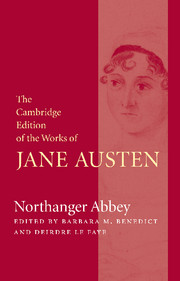Book contents
- Frontmatter
- Contents
- General Editor’s Preface
- Acknowledgements
- Chronology
- Introduction
- Note on the text
- Advertisement, by the Authoress, to Northanger Abbey
- Volume I Northanger Abbey
- Volume II Northanger Abbey
- Corrections and emendations to 1818 text
- Appendix: summaries and extracts from Ann Radcliffe’s novels
- List of abbreviations
- Explanatory notes
Chapter 16
Published online by Cambridge University Press: 18 December 2020
- Frontmatter
- Contents
- General Editor’s Preface
- Acknowledgements
- Chronology
- Introduction
- Note on the text
- Advertisement, by the Authoress, to Northanger Abbey
- Volume I Northanger Abbey
- Volume II Northanger Abbey
- Corrections and emendations to 1818 text
- Appendix: summaries and extracts from Ann Radcliffe’s novels
- List of abbreviations
- Explanatory notes
Summary
MR. AND MRS. MORLAND's surprize on being applied to by Mr. Tilney, for their consent to his marrying their daughter, was, for a few minutes, considerable; it having never entered their heads to suspect an attachment on either side; but as nothing, after all, could be more natural than Catherine's being beloved, they soon learnt to consider it with only the happy agitation of gratified pride, and, as far as they alone were concerned, had not a single objection to start. His pleasing manners and good sense were self-evident recommendations; and having never heard evil of him, it was not their way to suppose any evil could be told. Goodwill supplying the place of experience, his character needed no attestation. “Catherine would make a sad heedless young housekeeper to be sure,” was her mother's foreboding remark; but quick was the consolation of there being nothing like practice.
There was but one obstacle, in short, to be mentioned; but till that one was removed, it must be impossible for them to sanction the engagement. Their tempers were mild, but their principles were steady, and while his parent so expressly forbad the connexion, they could not allow themselves to encourage it. That the General should come forward to solicit the alliance, or that he should even very heartily approve it, they were not refined enough to make any parading stipulation; but the decent appearance of consentmust be yielded, and that once obtained—and their own hearts made them trust that it could not be very long denied—their willing approbation was instantly to follow. His consent was all that they wished for. They were no more inclined than entitled to demand his money. Of a very considerable fortune, his son was, by marriage settlements, eventually secure; his present income was an income of independence and comfort, and under every pecuniary view, it was a match beyond the claims of their daughter.
The young people could not be surprized at a decision like this. They felt and they deplored—but they could not resent it; and they parted, endeavouring to hope that such a change in the General, as each believed almost impossible, might speedily take place, to unite them again in the fullness of privileged affection.
- Type
- Chapter
- Information
- Northanger Abbey , pp. 258 - 262Publisher: Cambridge University PressPrint publication year: 2006

